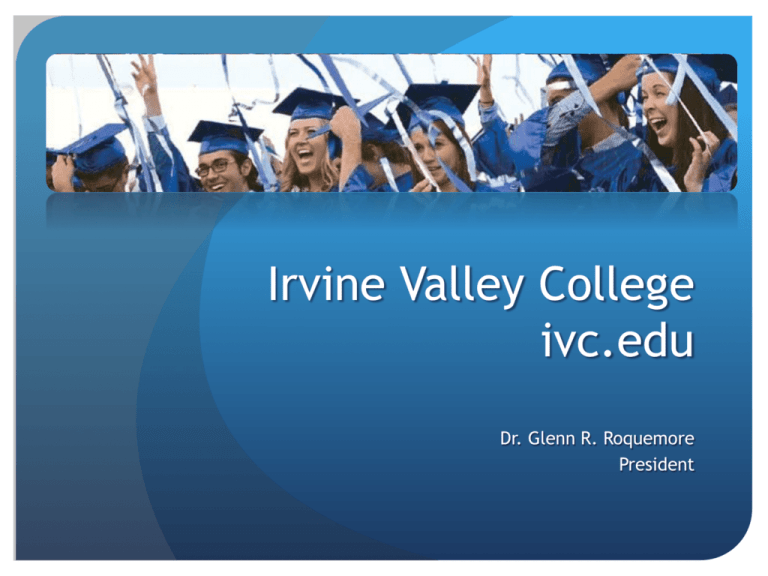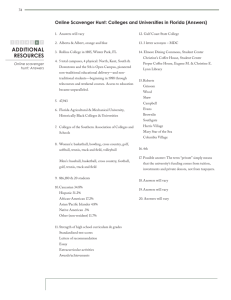IVC Presentation - Irvine Chamber Economic Development
advertisement

Irvine Valley College ivc.edu Dr. Glenn R. Roquemore President California Community Colleges General Facts With more than 2.1 million students on 112 campuses, the California Community Colleges is the largest system of higher education in the United States. California Community Colleges Value to California 51 percent of California State University and UC graduates started at a California community college. California Community Colleges General Facts Three out of every 10 Californians ages 18-24 are currently enrolled in a community college. Fifty-five percent of community college students are people of diverse ethnic backgrounds and roughly 53 percent are female. California Community Colleges Value to California California community colleges educate 70 percent of our state’s nurses. California community colleges train 80 percent of firefighters, law enforcement personnel, and emergency medical technicians. California Community Colleges Value to California Transfer students from the California Community Colleges to the University of California system currently account for 48 percent of UC’s bachelor’s degrees in science, technology, engineering and mathematics. Community colleges offer associate degrees and short-term job training certificates in more than 175 fields, and more than 100,000 individuals are trained each year in industry-specific workforce skills. Nearly 42 percent of all California veterans receiving GI educational benefits attend a California community college for workforce training, to earn an associate degree or to work toward transferring to a four-year university. California Community Colleges High Return on College Education The California Community Colleges is the largest provider of workforce training in the state and nation. For every $1 California invests in students who graduate from college, it will receive a net return on investment of $4.50. California Community Colleges High Return on College Education Californians with a college degree will earn $400,000 more in their lifetime than their peers with only a high school diploma. Students who earn a degree or certificate from a California community college nearly double their earnings within three years. California Community Colleges High Return on College Education Attending or graduating from a community college doubles an individual’s chance of finding a job compared to those who failed to complete high school. The California Community Colleges is the state’s most cost-effective system of education – the revenue needed to support one full-time community college student is slightly more than $5,000 per year. California Community Colleges High Return on College Education The California Community Colleges is the most costeffective system of education in California. While the state revenue needed to support one community college full-time student is slightly more than $5,000 per year, that same student costs approximately $7,500 in the K-12 system and $20,000 and $11,000, respectively, at UC and CSU. California Community Colleges High Return on College Education The U.S. Bureau of Labor Statistics projects that occupations that require an associate degree will grow by 18 percent through 2020 – faster than the new job growth for those with a bachelor’s degree. California Community Colleges Why focus on regions and on jobs and the economy? While colleges currently allocate considerable resources to serve and grow local economies, working from the perspective of a single college or district is no longer sufficient to address the magnitude of the problems created by the economic downturn. California Community Colleges Why focus on regions and on jobs and the economy? Regions are mobilizing around jobs and the economy. Community colleges need to do the same in order to remain vital partners in the workforce mission. Colleges must collaboratively respond and innovate in order to meet the needs of regional labor markets. California Community Colleges Why focus on regions and on jobs and the economy? Employers who compete in the marketplace, must also partner to create a shared talent pool. Colleges are being asked to respond on three fronts: a soft skills gap, a basic skills gap (including digital literacy), and an applied skills gap. California Community Colleges Why focus on regions and on jobs and the economy? Employers and colleges who partner regionally will be better able to prepare a competitive workforce. If businesses can collaborate, so can the California community colleges. California Community Colleges Colleges and regions need to work together to address the skills gap. The skills gap is a national problem that has left business without a crucial pipeline of the skilled workers they need in a rapidly changing economy. California Community Colleges Colleges and regions need to work together to address the skills gap. Federal economists estimate that 2+ million jobs go unfilled today as a result of training, skills and education gaps. California Community Colleges Colleges and regions need to work together to address the skills gap. While hard work is still important, postsecondary education is required and frequent retraining is necessary to stay current. Research indicates that an estimated 1.5 million job vacancies in the country consist of jobs that require more than a high school diploma but less than a bachelor's degree. California Community Colleges Colleges and regions need to work together to address the skills gap. The future competitiveness of the state, the ability for businesses to thrive, and the ability for students to become productive workers all require strategic investment in California’s community colleges to address the skills gap. Why Irvine Valley College? Transfer Students from Community Colleges to the University of California account for 48% of UC’s bachelor’s degrees in science, technology engineering and mathematics (STEM) Why Irvine Valley College? IVC students can get a guaranteed transfer to CSU or UC Our students also get into other fine schools USC Stanford Columbia University Johns Hopkins University Cornell University Award Winning Academic Programs Administration of Justice Debate Engineering Model United Nations Music-Instrumental Psychology IVC Debaters Dominate Tournaments Dr. Gary Rybold, Debate Coach Award Winning Faculty Authors Grammy winner Scientists Artists Web Designers Fulbright Scholars Entrepreneurs Coaches Exceptional Students The Student Government of the Associated Students exists to serve the students at IVC through awareness, advocacy and representation. ASIVC Senate serves as the official voice for all students of the College. The Inter Club Council (ICC) consists of all Associated Students of Irvine Valley College registered and approved clubs. IVC is home to over forty student clubs that bring together students with shared interests ranging from academics, sports, art and cultural backgrounds. Professional Staff Dedicated to student success Willing to help you reach your goals with all of our resources Programs 60 Associate Degree Programs 50 Certificate Programs Programs include… Biology, Chemistry, English, History Electronics, CISCO/Security, Networks Recycling and Resource Management Paralegal Studies, Accounting, Entrepreneurship, Management Digital Arts Media Communication Studies AA DEGREES & CERTIFICATES Accounting Acting Administration of Justice Administrative Assistant Animation for Games Anthropology Art Art History Biology Business Management Chemistry Child Development Civil-Computer-Aided Design Coaching Commercial Dance Communication Studies Computer-Aided Design Computer Applications Computer Languages Dance Design Model Making and Rapid Prototyping Digital Graphic Applications Digital Media Art AA DEGREES & CERTIFICATES Digital Photography Early Childhood Associate Teacher Economics Electrician Trainee Electronic Technology English Entrepreneurship Skills Fine Arts Fitness Professional French Geography Geology Health Sciences History Humanities Japanese Kinesiology Laser Technology: Photonics Liberal Studies Live Entertainment Technician Local Area Networks: Cisco Mathematics Mechanical Computer-Aided Design AA DEGREES & CERTIFICATES Museum Education and Visitor Services Music Natural Sciences and Mathematics Office Assistant Paralegal Studies Philosophy Pre-Law Physical Science Physics Political Science Pre-Engineering Psychology Real Estate Recycling and Resource Management Research Tools for Entrepreneurs Retail Management Sociology Spanish Spreadsheets Technical Theatre Theatre Arts Web Authoring UC Guarantee IVC has Transfer Admission Guarantees (TAGs) with six University of California Campuses. These guarantees allow qualifying IVC students to receive guaranteed admission to the participating UC of their choice. Athletics Since 1990, IVC has been committed to maintaining a strong athletic and academic tradition. Competing as a member of the nation’s toughest college conference, the Orange Empire Conference, Irvine Valley teams have collected 20 state championships and 39 conference titles from 1990 through the fall of 2014. Transfer IVC #1 transfer rate in the state at 60%. TAG agreements with six UC campuses IVC offers dozens of honors courses and is a member of the Honors Transfer Council of California and the UCLA Transfer Alliance Program. (TAP) Career Technical Education CTE programs at IVC are designed to prepare students for a high-skill, high-wage, high-demand career within the current job industry. IVC offers over 30 career certificates designed for completion in two years or less. Extended Education Emeritus Institute serves around 5000 students and offers over 200 classes annually. Authorized Testing Center Community Education Classes www.123GetSmart Accreditation Irvine Valley College is accredited by the Western Association of Schools and Colleges Associate in Arts: 38 majors Associate in Science: 20 majors Associate in Arts for Transfer: 8 AA Transfer AA-T Associate in Arts for Transfer: 5 AS Transfer AS-T Occupational Certificates: 61 programs: 25 certificates of achievement (18-unit or greater state-approved programs) plus 36 certificates of proficiency (low-unit locally approved programs) questions






